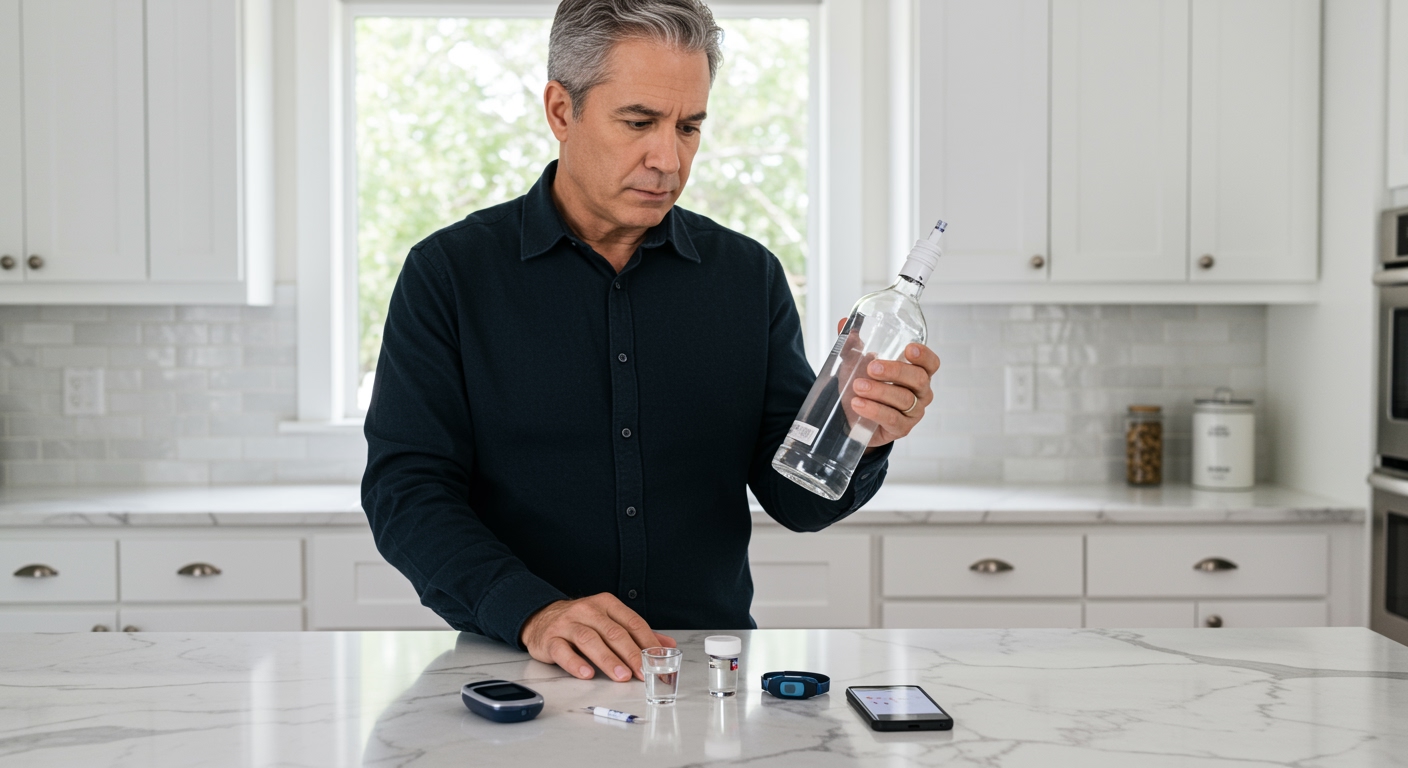✪ Key Takeaway: Vodka can dangerously lower blood sugar in diabetics and should only be consumed with food and careful monitoring.
Introduction
Your doctor told you to watch your blood sugar, but nobody mentioned what happens when you pour that crystal-clear vodka into your glass.
You might be wondering if vodka is safer than other alcoholic drinks because it has no carbs or sugar, or maybe you heard conflicting advice from friends who swear it actually helps their diabetes.
Hi, I’m Abdur, your nutrition coach, and today I’m going to explain exactly how vodka affects your blood sugar levels and whether it belongs in your diabetes management plan.
How Does Vodka Actually Affect Blood Sugar?
Vodka contains zero carbohydrates and zero sugar, which makes many diabetics think it won’t affect their blood glucose levels.
This assumption is completely wrong and potentially dangerous.
When you drink vodka, your liver immediately stops producing glucose and focuses entirely on metabolizing the alcohol.
Your liver normally releases stored glucose into your bloodstream to maintain steady blood sugar levels between meals.
But alcohol hijacks this process completely.
The result is that your blood sugar can drop dangerously low, especially if you haven’t eaten recently or if you take diabetes medications.
This condition, called hypoglycemia, can cause confusion, dizziness, sweating, and even loss of consciousness.
✪ Fact: Alcohol-induced hypoglycemia can occur up to 24 hours after your last drink.
What About Vodka and Insulin Resistance?
Regular vodka consumption creates a complex relationship with your body’s insulin sensitivity.
Some studies suggest that moderate alcohol intake might temporarily improve insulin sensitivity in certain people.
However, this apparent benefit comes with serious drawbacks that outweigh any potential advantages.
Chronic alcohol consumption, even in moderate amounts, can lead to fatty liver disease, which directly worsens insulin resistance over time.
Your liver becomes less efficient at managing glucose when it’s constantly processing alcohol and storing excess fat.
Additionally, alcohol disrupts your sleep patterns, increases cortisol levels, and can lead to weight gain around your midsection.
All of these factors contribute to worsening insulin resistance and make diabetes management much more difficult.
✪ Pro Tip: Track your blood sugar for 24 hours after drinking to understand your personal response pattern.
Can Diabetics Drink Vodka Safely?
The answer depends entirely on your individual health status, medication regimen, and ability to monitor your blood sugar carefully.
If you take insulin or medications like sulfonylureas that can cause hypoglycemia, vodka becomes significantly more dangerous.
These medications combined with alcohol create a perfect storm for severe low blood sugar episodes.
For diabetics who don’t take these high-risk medications, very moderate consumption might be possible with strict precautions.
This means no more than one standard drink for women or two for men, and never on an empty stomach.
You must eat a balanced meal containing protein, healthy fats, and complex carbohydrates before drinking.
Always check your blood sugar before drinking, two hours after, and again before bed to catch any delayed drops.
✪ Note: Never drink alcohol if your blood sugar is already below 100 mg/dL.
What Are The Long-Term Risks?
Regular vodka consumption creates cumulative health risks that are particularly dangerous for people with diabetes.
Cardiovascular complications top the list, as diabetics already face higher risks of heart disease and stroke.
Alcohol raises blood pressure, increases triglyceride levels, and can cause irregular heart rhythms.
Your kidneys, already stressed by diabetes, face additional damage from regular alcohol processing.
Diabetic neuropathy, the nerve damage caused by high blood sugar, can worsen significantly with alcohol consumption.
Perhaps most concerning is how alcohol affects your ability to recognize and respond to hypoglycemic episodes.
The symptoms of low blood sugar and alcohol intoxication overlap considerably, making it difficult to identify dangerous drops in glucose levels.
✪ Fact: Alcohol can mask hypoglycemia symptoms for up to 12 hours after consumption.
The Bottom Line
Vodka is not good for diabetes management and carries significant risks that outweigh any perceived benefits.
Your health is worth more than any temporary pleasure alcohol might provide, and there are countless ways to enjoy social situations without compromising your blood sugar control.
I’d love to hear about your experiences with alcohol and diabetes management, or any questions you might have about making safer choices for your health – please share your thoughts in the comments below.
References
At NutritionCrown, we use quality and credible sources to ensure our content is accurate and trustworthy. Below are the sources referenced in creating this article:
- WebMD: Diabetes and Drinking Alcohol
- PMC: Alcohol and Diabetes
- Mount Sinai: Diabetes and Alcohol
- Medical News Today: Diabetes and Alcohol





